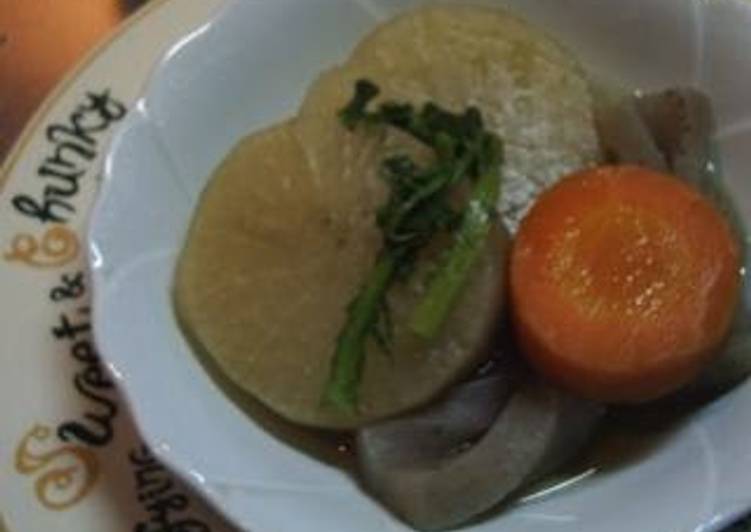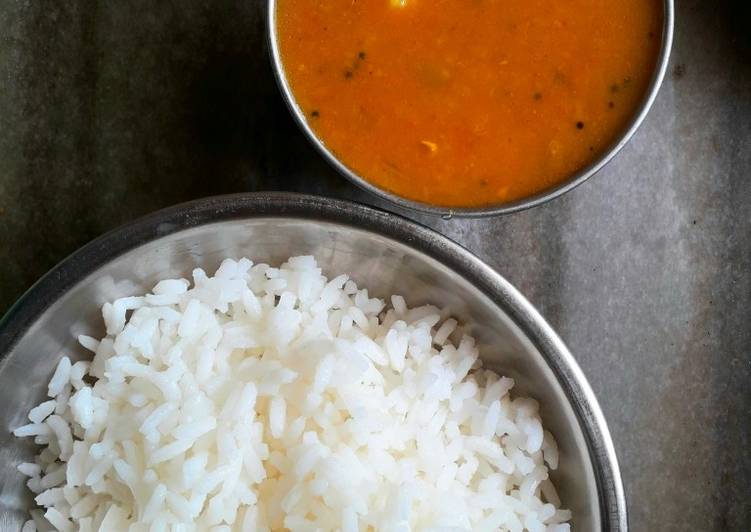
Hello everybody, it’s Drew, welcome to our recipe page. Today, I will show you a way to make a special dish, simmered daikon radish and carrot (a taste of home). It is one of my favorites. For mine, I am going to make it a little bit tasty. This will be really delicious.
Simmered Daikon Radish and Carrot (A Taste of Home) is one of the most well liked of current trending meals in the world. It’s appreciated by millions every day. It is simple, it is fast, it tastes delicious. Simmered Daikon Radish and Carrot (A Taste of Home) is something that I’ve loved my whole life. They are nice and they look fantastic.
Furofuki Daikon is a simple yet delicious way to enjoy the Japanese Daikon Radish. There are many variations, but this is the basic recipe for this rustic. Place daikon and carrot in a glass jar with the cilantro and chile peppers.
To begin with this particular recipe, we must prepare a few components. You can have simmered daikon radish and carrot (a taste of home) using 8 ingredients and 7 steps. Here is how you cook it.
The ingredients needed to make Simmered Daikon Radish and Carrot (A Taste of Home):
- Make ready 8 cm Daikon radish
- Get 1/3 of a block Konnyaku
- Prepare 3 cm Carrot
- Get 400 ml Dashi stock (kombu and dried shiitake mushrooms)
- Get 2 tbsp Sake
- Prepare 1 tbsp Beet sugar
- Make ready 1/2 tsp Salt
- Take 1 tbsp Soy sauce
Simmered Kiriboshi Daikon, like many recipes on Just One Cookbook, are commonly cooked dishes in Japanese homes. Basically, Japanese daikon radish is shredded into thin strips and dried in the sun. The soaking water has a sweet taste to it, so we can use it to cook simmered dishes, soups. Daikon radish is a common vegetable in Asian.
Steps to make Simmered Daikon Radish and Carrot (A Taste of Home):
- [Preparation Step 1]: Peel the daikon and slice into 2 cm thick rounds (into 4 pieces). Boil the daikon until soft in water used to rinse rice. If you don't have any rice soaked water, add some uncooked rice into the water when boiling.
- [Preparation Step 2]: Cut the konnyaku into 7-8 mm thick slabs. Make a slit down in the middle of each piece. Take one end of the konnyaku, thread it through the center to make a "rein knot." Rub with salt, place in a pan, and bring it to a boil, then turn off the heat.
- [Preparation Step 3] Slice the carrot into 1 and 1/2 cm rounds (into 2 pieces).
- [To simmer] Put the dashi stock into a pot, add the prepared items from Step1, Step 2, and Step 3, then turn on the heat. When it comes to a boil, add the sake, sugar, and salt, then simmer. After about 10 minutes, add the soy sauce.
- Keep simmering until the carrot becomes soft and the flavors have been fully absorbed by all the ingredients (I added some daikon leaves in this photo).
- Bonus: I make the dashi stock regularly to keep in stock. To make the dashi, add 1 piece of kombu and 3 dried shiitake mushrooms to 1000-1200 ml of water and soak for 30 minutes to 1 hour, then and it's ready!I keep the leftover rehydrated shiitake mushrooms and kombu to make tsukudani (sweet-salty simmered dish.)
- I made this dish with kabocha squash, fava beans, and kombu. The daikon was quite thin, so I cut it in a different way.
Typically in season during winter but available all-year round. There are many daikon radish recipes I hope you enjoy making this tasty carrot and daikon radish salad at home. Daikon is the Japanese name for the big white radish. If you want to remove the skin, do so with a peeler like you would with a carrot. After sufficient simmering, it loses its spicy taste and takes on the flavour of the soup or stew it is cooked in.
So that’s going to wrap this up for this special food simmered daikon radish and carrot (a taste of home) recipe. Thank you very much for reading. I’m confident that you will make this at home. There’s gonna be more interesting food at home recipes coming up. Remember to save this page in your browser, and share it to your family, colleague and friends. Thanks again for reading. Go on get cooking!

